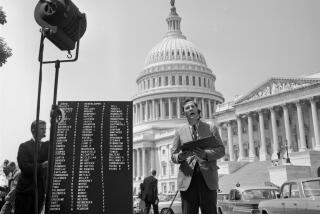Jubilee Called the True ‘Independence Day’ for Blacks : Celebrations: Event marks the signing that ended slavery. NAACP leader says the document of 1776 ‘didn’t have our name on it.’
- Share via
PACOIMA — For African Americans who observe it, Jubilee Day is Independence Day, commemorating Jan. 1, 1863, when President Abraham Lincoln signed the Emancipation Proclamation, the document that freed the slaves.
Dr. Benjamin F. Chavis Jr., executive director of the NAACP, which created the holiday about 15 years ago, hammered home that point Sunday as he spoke to a group of about 75 people who attended the 15th annual Jubilee Day celebration at the Greater Community Missionary Baptist Church.
“It is our Declaration of Independence,” said Chavis. “The one done up in 1776 didn’t have our name on it,” he said.
For community activist Ted Minor, such celebrations are instrumental in instilling pride among a people whose contributions have been largely ignored in the nation’s history books.
“It helps to give us and our children a sense of personal dignity, and it helps further our culture and heritage,” said Minor, who donned a green dashiki for the event.
Chavis’ comments came after an arm-waving revival-like service at the small, stucco church tucked into the 11000 block of Norris Avenue in the heart of an African-American community.
Chavis, who took over the leadership from Dr. Benjamin Hooks last April, challenged religious leaders and their congregations to carry the concepts of unity and brotherhood outside the church and into the streets as a method for curing social ills and furthering economic empowerment.
“We have to leave a legacy for our young people to take hold,” he told the crowd. “We have to lift them up because if we don’t, who will?” he asked.
“If you take for granted your progress, you will lose it,” he warned. “If you take for granted your life, you’ll lose it.”
Chavis also prodded the congregation to take greater responsibility for its neighborhoods and its children. He said they used to be a community responsibility but are now often left on their own in neighborhoods rocked by violence and drugs.
“A lot of times things don’t happen in our community because we’re waiting for someone else,” he said. “We have to take the initiative.”
He endorsed projects that encourage people to turn in guns and urged citizens to come to the aid of the vast majority of young African Americans who are not connected with gangs.
Flanked by church leaders and local NAACP leaders, Chavis said he wants to use the network of more than 2,300 branch offices around the nation to broadcast a message about economic empowerment and cultural values to African Americans.
“There are groups who’ve come here since the Emancipation Proclamation and they’re participating in our economy,” said Chavis.
Under such a system, establishment of African American financial institutions would provide a solid base for business ventures and mainstream economic participation, he said.
The first step of the organization’s economic push for blacks was seen in the “fair share” agreements of the early 1980s, contracts between the civil rights group and U.S. corporations to increase employment opportunities for African Americans.
“In the 1950s, it was enough just to get a job--we didn’t care where,” said William Gibson, chairman of the NAACP board of directors.
“But like anything else, our organization has evolved and matured, and today when I talk to a CEO about jobs, I’m not just talking about clerical work anymore,” Gibson said.
Chavis and other top NAACP officials are in Los Angeles for the taping of the 27th annual Image Awards, which are held to recognize achievements by African Americans in the entertainment industry. Chavis and other officials had spent Sunday morning at the historic Second Baptist Church in South-Central Los Angeles.
More to Read
Sign up for Essential California
The most important California stories and recommendations in your inbox every morning.
You may occasionally receive promotional content from the Los Angeles Times.













